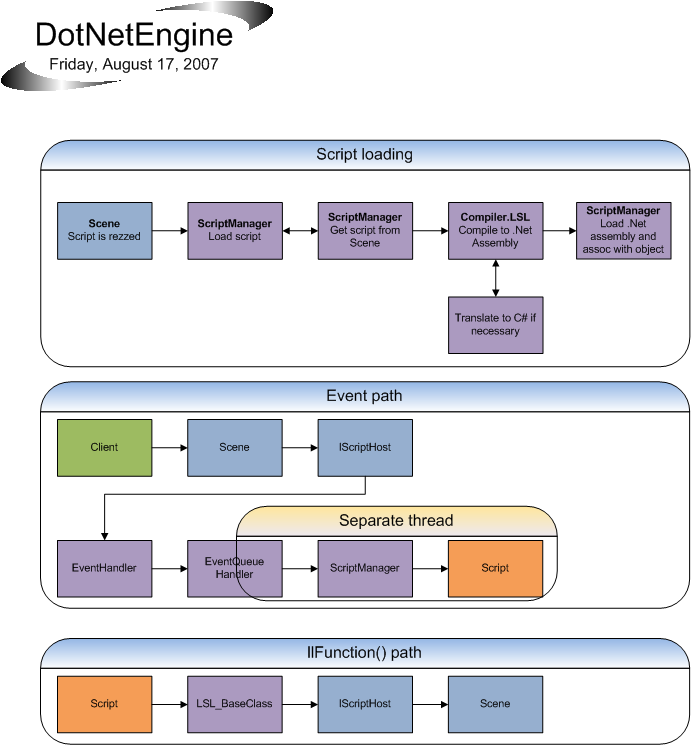OpenSim.Region.ScriptEngine.DotNetEngine
From OpenSimulator
m (Robot: Cosmetic changes) |
|||
| Line 4: | Line 4: | ||
== DotNetEngine == | == DotNetEngine == | ||
| + | |||
| + | '''Note: [[XEngine]] became the default scripting engine in OpenSimulator 0.6.8. In later versions of OpenSimulator, DotNetEngine was removed entirely. These notes are kept for historical purposes.''' | ||
Namespace: OpenSim.Region.ScriptEngine.DotNetEngine | Namespace: OpenSim.Region.ScriptEngine.DotNetEngine | ||
Revision as of 11:27, 9 April 2013
DotNetEngine
Note: XEngine became the default scripting engine in OpenSimulator 0.6.8. In later versions of OpenSimulator, DotNetEngine was removed entirely. These notes are kept for historical purposes.
Namespace: OpenSim.Region.ScriptEngine.DotNetEngine
DotNetEngine is a ScriptEngine that executes LSL scripts contained within objects.
Core development blog
To look at the LSL command implementation status, go to LSL Status.
How it works
- Create instance of ScriptEngine(scene).
- ScriptEngine will create instances of:
EventManager EventQueueManager ScriptManager AppDomainManager LSLLongCmdHandler
- EventManager will hook up all necessary events. (all possible script events, script rez, script derez, etc)
- When events are received, they are processed inside EventManager.
For example: Event for loading a script will be processed and EventManager will tell ScriptManager to load the script. Event such as touch_start is received in EventManager then sent to EventQueueManager that will tell SCriptManager to execute the touch_start function in the script.
Note! If event is for a particular object, EventQueueManager will queue event for all scripts inside that object.
- If it is a script rez then OpenSim.Region.ScriptEngine.DotNetEngine.Compiler.LSL will compile the script to .Net Assembly.
- This assembly is loaded into an AppDomain created by AppDomainManager.
- EventQueueManager has a separate thread running to process its event queue. Events are actually functions inside the script .dll that is called "<state>_event_<event_name>" for example "default_event_touch_start". State is read from a global variable in the script .dll.
- Some commands require more time before returning, processing these is done in LSLLongCmdHandler.
- Every script receives a private instance of LSL_BuiltIn_Commands. This is their only way of manipulating anything outside themselves.
Places to extend script support
- LSL_BuiltIn_Commands.cs
These are the functions script can use to manipulate the scene. Commonly known as ll-functions. They are LSL functions such as llSay, llWhisper, etc. LSL Status contains up to date status on what functions have been implemented. Anyone who wants to contribute can implement a command and put a patch on the [http://www.opensimulator.org/mantis bug tracker}.
- EventManager.cs
This is where events are coming from server and being queued for scripts. All 16 or so LSL events needs to be implemented here.
This image is a bit (not much) outdated, but gives you an idea of the path script events/functions go through.

